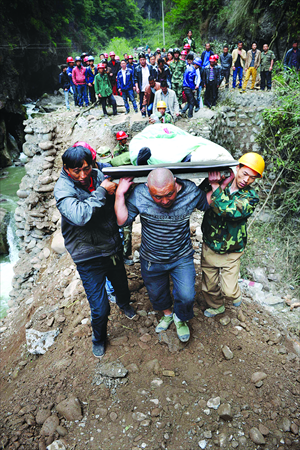Quake rescue grows frantic

Continual aftershocks and insufficient relief supplies are hampering the rescue efforts Sunday in Lushan and neighboring counties of Sichuan Province that were badly hit by a 7.0-magnitude earthquake on Saturday morning.
By Sunday night, the quake had caused at least 186 deaths and 11,393 injuries, with 21 reported missing, according to latest statistics from the provincial emergency response command center.
Nearly 3,000 kilometers of roads were damaged and 26,411 houses collapsed, said Zhong Mian, a deputy governor of Sichuan.
"The number of wounded is set to rise as many areas have yet to be reached by the rescue teams," Feng Zhiming, top researcher at the Institute of Geographic Sciences and Natural Resources Research under the Chinese Academy of Sciences, told the Global Times.
More than 1,70o aftershocks had been detected as of 10 pm Sunday, with the most serious one being 5.4-magnitude occurring at 5:05 pm Sunday.
President Xi Jinping gave orders soon after the quake and Premier Li Keqiang directed rescue work at the scene, both stressing that top priority should be given to saving lives.
The government reacted quickly this time and more advanced search and rescue methods were applied compared to the deadly Wenchuan earthquake in 2008, said Feng.
"Five years ago, we missed the golden time for rescue as helicopters were not dispatched immediately. But this time, the air force sent helicopters to transfer the wounded and relief resources at the first opportunity," Feng said.
The Global Times reporter in Baoxing county, one of the hardest-hit areas, learned that every firefighter in Lingguan township has been equipped with life detection instruments and different cutting tools.
"Unfortunately, the heavy excavators and cranes arrived around 7 pm Sunday, 35 hours after the disaster," Wu Xiaobin, a deputy director of the fire brigade from Ganzi, where three people were killed in the quake, told the Global Times.
Due to severe traffic congestion caused by the numbers of cars and secondary disasters such as landslides, daily necessities, heavy excavators and cranes were prevented from entering Baoxing, where the damaged main road was repaired on Sunday afternoon but was later disrupted again by landslides.
Meanwhile, main roads to Lushan county, the epicenter of the quake, were also severely jammed by both official rescue vehicles and those of volunteers from across the nation.
"The traffic jams are expected, as the main road to Ya'an and its counties could only accommodate several thousand cars," a traffic police officer in Mingshan county told the Global Times, estimating that over 20,000 vehicles have flooded to the quake-stricken areas, prompting the public security ministry to issue restrictions on vehicles of self-organized volunteers Saturday afternoon.
The State Council on Sunday afternoon said that in order to facilitate the urgent rescue efforts, no individuals and organizations would be allowed to go to these areas.
It added that money donations are preferred while relief resources should be transported by civil affairs authorities.
Feng said that the government should have drawn up a detailed rescue plan, including arrangements for personnel permitted to enter the quake-hit areas.
"Professional rescue teams should complete the life-saving work first before any efforts from volunteers, who may unwittingly add to the problems," Feng said.
Nearly all houses in Baoxing collapsed, including those rebuilt after the earthquake in 2008. Water sources were damaged and electricity has not been resumed.
As the National Meteorological Center forecast Sunday, temperatures in the quake-hit areas will be between 14 and 24 C from Monday to Wednesday, and light to moderate rain will also be expected, causing further difficulties for disaster-relief work and bringing about more secondary disasters, as well as worsening the traffic jams.
Shelters and temporary resettlement areas should be set up far from mountains or river banks in case another disaster strikes or landslides occur, said Feng.
However, under such conditions, anyone buried under rubble could survive more than 72 hours, known as the "golden time for rescue" after the earthquake, to one week at most, Nie Gaozhong, a professor with the Institute of Geology, China Seismological Bureau, told the Xinhua News Agency, adding that rescuers still have time to save lives.
